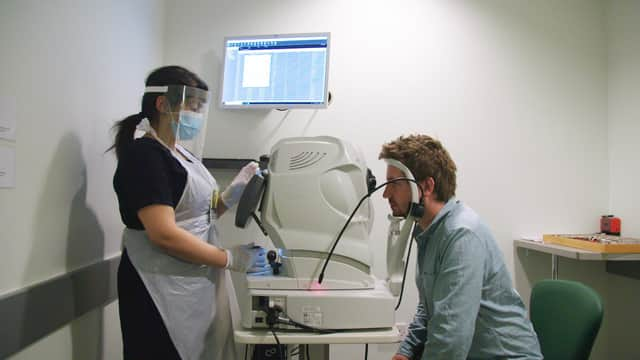Milngavie eye doctor in 'ticking timebomb' warning


Charles Kinsey, store director at Specsavers in the village, says the stark findings from a national report show there were 4.3 million fewer eye appointments during the pandemic – with 78,061 of missed appointments at Specsavers stores across the west of Scotland.
The State of the UK’s Eye Health Report 2021, commissioned by Specsavers in collaboration with leading eye health experts and charities, counts not only the additional financial burden now facing society as a result of the pandemic, but more worryingly, the cost to people’s sight.
Advertisement
Hide AdAdvertisement
Hide AdUK-wide, it shows that almost 3,000 people (2,986) are estimated to have lost their sight due to delayed identification and treatment of eye disease during the pandemic and more than 300,000 (316,000) people have missed referrals for ophthalmology services.
Neil said: ‘As comprehensive as this report is, we, along with our colleagues and partners across the eye health sector, suspect these early findings are just the tip of the iceberg.
‘The pandemic meant that eye care services in the UK were withdrawn, reduced or restricted, and despite Specsavers being open for care throughout the pandemic, our stores alongside other high street opticians, saw a drop of almost 25 per cent in eye tests across the sector.
‘This has led to a reduction in referrals and the treatment of serious, and sometimes symptomless, eye conditions that can lead to irreversible and permanent sight loss if not detected and managed in time. The eye health sector, and the NHS, has a ticking timebomb on its hands.”
Advertisement
Hide AdAdvertisement
Hide AdThe findings are being reflected locally with up to date figures showing 4,370 people are living with sight loss in East Dunbartonshire.
It also shows an estimated 1,390 people have glaucoma, 7,160 have age-related macular degeneration and 1,460 have cataracts.
Neil said: “If people in East Dunbartonshire have missed their appointment during the pandemic, I urge them to book. We are still adhering to strict safety precautions in every one of our stores.”
It’s important people keep having regular appointments – even if they don’t think anything is wrong.”
"Many conditions are symptomless in the early stages.”
Advertisement
Hide AdAdvertisement
Hide AdAhead of National Eye Health Week (20-26 September) Specsavers commissioned research, carried out by OnePoll[5], which reveals 35 per cent of Scots have delayed having an eye test, knowing that they were due to have one or feeling like they should have one.
Reasons for doing so included fearing being told their eyesight had worsened (14 per cent) and being frightened about being told they had a more serious condition (14 per cent). However 85 per cent said they would be annoyed at themselves for ignoring the symptoms of an irreversible health condition.
In fact, 39 per cent of people in Scotland have experienced floaters in their eyes, 31 per cent have experienced their eyes being dry and 29 per cent have suffered from headaches or migraines.
Many Scots have ignored or tolerated these symptoms with 19 per cent admitting ignoring floaters in their eyes, 16 per cent ignoring their eyes feeling dry and 15 per cent tolerating headaches and migraines.
Advertisement
Hide AdAdvertisement
Hide AdAnd worryingly 16 per cent of people think they might have a serious underlying sight issue that they haven’t had looked at because of the Covid-19 pandemic.
Neil adds: ‘Regular eye tests are so important. If people in East Dunbartonshire have missed their appointment during the pandemic, I urge them to book. We are still adhering to strict safety precautions in every one of our stores. It’s important people keep having regular appointments – even if they don’t think anything is wrong – as many conditions are symptomless in the early stages.’